INNOVATIVE LESSON: WATER CONVENTION'S IMPLEMENTATION COMMITTEE PROVIDES ADVICE TO ALBANIA AND MONTENEGRO ON THE TRANSBOUNDARY CIJEVNA/CEM RIVER
In 2020, the Implementation Committee under the UNECE Convention on the Protection and Use of Transboundary Water Courses and International Lakes (Water Convention) initiated its advisory procedure in response to a request made by Montenegro related to its concerns about the possible transboundary impact of planned additional small hydropower plants on the Cijevna/Cem River in Albania. Albania has subsequently accepted to participate in the advisory procedure that would facilitate the implementation of the Water Convention.
The Committee enquired all needed information from Albania and Montenegro, held separate and joint consultation sessions with the countries and, as a result, provided operational advice on how to establish effective interaction between the parties.

Following joint consultations facilitated by the Committee, Montenegro and Albania agreed:
- That the existing bilateral commission established under the 2018 Framework Agreement should establish a joint technical working group on “Monitoring and assessment”, define the mandate of the joint technical working group based on pressures in the Cijevna/Cem River basin and ensure its regular meetings;
- To develop and implement an information exchange protocol;
- To use the meetings of the bilateral commission to exchange information, including on existing and planned uses of water and related installations;
- To convene the next meeting of the bilateral commission in the third week of March 2021, with a view to setting up the joint technical working group;
- To ensure that the meetings of the bilateral commission were held regularly in the future.
The Committee stated its readiness to assist Montenegro and Albania in the implementation of the advice and that a member of the Committee, Mr. Cunha Serra, would be available to assist the countries, as appropriate, in the implementation of the technical aspects of the Committee’s advice, should such assistance be welcomed by the two countries.
The results of the first consultation session of the Committee allow making the following conclusions:
- Applying to the Committee does not necessarily mean “unfriendly” relations between the countries. On the contrary, this indicates to respect to each other, willingness to remove at the earliest existing concerns and readiness to discuss possible solutions in a constructive way and with the help of experts. Montenegro and Albania have shown the strongest respect of their obligations to cooperate in the spirit of good faith. Albania had promptly accepted to participate in the procedure initiated by Montenegro. Both countries replied to requests of the Committee for further information, openly stated about the lack of information, actively participated in searching for possible solutions and largely contributed to openness of the process by agreeing to make the information on the process and its results publicly available.
- The Committee demonstrated its capacity for competent and quick response to country requests. The Committee suggested an advisory procedure to the parties during one month since the receipt of the request from Montenegro. The Committee’s members have thoroughly examined complex and detailed technical documentation on the matter and were able to quickly process the request, despite some obstacles caused by the pandemia of COVID-19. This favorably distinguishes the Committee from other frameworks dealing with disputed matters that may delay for years.
- The Committee has organized its work in such a way that the countries itself were co-initiators of proposed solutions, step by step from the simple to the complex. This made it possible to make feasible concrete decisions that would lay the foundation of more effective bilateral cooperation between the countries. The Committee also offered its assistance in next steps, thus showing its interest in the implementation of its advice in practice and going beyond the formal closure of the procedure.
- The advisory procedure showed that the Water Convention and the Implementation Committee are of practical importance in the multistep water management system. Montenegro and Albania have a bilateral agreement and a bilateral commission, and both countries cooperate as the Drin riparians. Nevertheless, global mechanisms were able to facilitate first positive steps towards cooperation.
General information: The Implementation Committee under the UNECE Water Convention was established by the Meeting of the Parties to the Convention in 2012. It consists of nine members – lawyers and water management professionals – that were elected by the Meeting of the Parties to serve in personal capacity (Kari Kinnunen, Johan G. Lammers, Stephen McCaffrey, Martins Paparinskis, Anne Schulte-Wulwer-Leidig, Pedro Cunha Serra, Attila Tanzi, Ivan Zavadsky and Dinara Ziganshina).
The Committee’s report can be read here.
Prepared by D. Ziganshina,
Vice-Chair, Implementation Committee
|